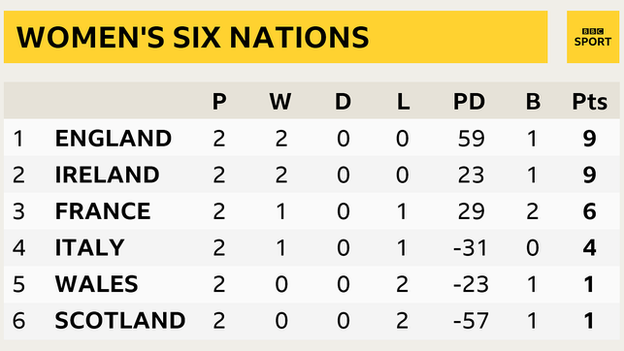Women's Six Nations Q&A: Should women play with smaller ball? Why no Women's Six Nations prize money?
- Published

Defending Grand Slam champions England beat Scotland to go top of the Women's Six Nations table
Women's Six Nations: round three fixtures | |||
|---|---|---|---|
Date | Match | Kick-off | Coverage |
Sunday, 23 February | Wales v France | 12:00 GMT | Watch on BBC Wales |
Sunday, 23 February | England v Ireland | 12:45 GMT | Watch on BBC Sport website |
Sunday, 23 February | Italy v Scotland | 17:10 GMT | Watch on BBC Sport website |
The BBC Sport website will have video clips from all three matches and you can also watch match highlights on BBC Two from 00:00 GMT on Monday, 24 February. | |||
Should women play with a smaller ball? How many professional women's teams are there? Why is there no prize money in the Women's Six Nations?
The Women's Six Nations has put women's rugby in the spotlight and, as the game attracts new fans, these are just a few of the talking points.
After the tournament's first two rounds, BBC Women's Rugby Union Weekly podcast called for questions from listeners.
Presenter Sara Orchard and former Wales captain Philippa Tuttiett answered them, with a little help from two of the sport's top referees, JP Doyle and Sara Cox.
Should women play with a different-sized ball?
Women's rugby is played on the same-sized pitch, with the same laws and same size five ball as men's rugby.
A smaller ball has previously been trialled in both the sevens and XVs game, but these trials did not lead anywhere and Doyle thinks it is time for change.
"If you look across all sports, they all adjust for different ways of playing," he said. "A good example is NFL to college football. Many people won't know that it is a same-sized ball but it is shaped in a different way.
"Even in golf, the women's drivers are different to the men's drivers. Rugby is one of the few sports where the women's game is played exactly the same. It's not about playing with a size five or a size four, but why in the women's game don't they design their own ball?"
Doyle argues that a smaller ball would be easier to handle and allow for more of the exciting individual tries we have already seen a lot of in this year's Women's Six Nations, like England centre Emily Scarratt's score against France.
Emily Scarratt scores decisive try as England beat France
Cox believes that players must be consulted about any changes, but Tuttiett remembers how "polarised" opinions were in the Wales team when she was playing.
"They trialled a smaller ball - a size four - when I was playing," she explained. "I loved it. I was doing the kicks for goal and I increased my distance.
"I remember having conversations with my team-mates and it was so polarised. You talk to players about it and you get half the team who say, 'absolutely not, we can handle a size five. It should be equal with the men's game'."

Why do the women not get any prize money?
The prize fund for the men's Six Nations rose to a record £16m this year and if a team wins the Grand Slam they could earn £6m.
England are on course to claim a second successive Grand Slam in the women's competition this year but as the tournament does not have a title sponsor, there will be no prize money even if they do.
"It is such a shame," said Tuttiett. "Most of the teams are amateur, any financial contribution would make a difference. But without a title sponsor, I can't see how prize money will happen."
The Six Nations announced last week that they would be bringing the men's, women's and under-20s Six Nations into one media rights package and this alignment with the male competition could benefit the women's tournament financially - but Orchard points out that there could be negative consequences too.
"There is a move at the moment to change the Women's Six Nations," Orchard explained. "Bringing all the tournaments into one package will be worrying for Spain's women's rugby team.
"They were in the Women's Six Nations but their place was taken by Italy in 2007, purely because the men's Italian side was in the tournament, and the change could mean it is less likely for Spain to come back. But it is promising that there will be a better structure for the women's tournament going forward."
Women's Six Nations: Abby Dow tries in treacherous Murrayfield conditions
Are England and France the only two professional teams in the competition?
The Rugby Football Union gave 28 players full-time contracts for the 2019-20 season, while French players are semi-professional.
Ten Scotland players have contracts with the Scottish Rugby Union for this season, with some offered financial support and others the beneficiaries of an agreement between the SRU and their employers to give them time to train and compete.
Italy and Wales get their expenses paid for, while Ireland get per diems - a set amount of money every day when they play.
The edge England's professionalism gives them is plain to see on the pitch, as shown in their 53-0 victory against Scotland on Monday.
France and England, the two most professional sides, have each won two of the past four Six Nations and the Red Roses are firm favourites to defend their Grand Slam after beating Les Bleues on the opening weekend.
"It is a different situation with every union," said Orchard. "France are the most likely to turn fully professional next, there are no indications from the other unions that there is anything else brewing. Scotland's are not on big contracts like England have and there is no sign of anything like that from the other home nations yet.
"It is not even a two-horse race. It is a one-horse race. Barring something incredible happening, it is going to be England winning a Grand Slam."
Tuttiett added: "You almost see it as a Five Nations with a bonus game each week to see where the game could be when you watch England play. It's a tough ask for the other teams to try and compete. The competition between everyone else is pretty healthy though."
Women's Six Nations: Beibhinn Parsons scores Ireland opener against Wales
What did Scottish players tell employers when England game was postponed?
Scotland's game against England was supposed to take place on Sunday, but was postponed until Monday because of Storm Ciara,
A lot of Scottish players have jobs alongside their rugby careers, so playing on the first day of the working week was far from ideal, but number eight Jade Konkel told the podcast that the SRU had helped players resolve the issue.
"Most girls have a really good relationship with their employers, who are understanding," she said "I also think that because the SRU had spoken to each player, it helped players with any discussions they were due to have."
Balancing work and rugby was a challenge for Tuttiett too, who set up her own building company while playing for Wales.
"Once we were playing away and our logistics changed so we had to go out a day earlier," she said. "I was self-employed so if I wasn't working I wasn't earning.
"Some girls had real issues with their employers not granting them leave or having to use up their holiday. The amount of holiday these girls have to use anyway... some of them would get to the summer holidays and all they could do was a long weekend with their families. It is tough."
Women's Six Nations: Cyrielle Banet scores length-of-the-field try for France
Are the tactics the same in the women's game?
Referee Doyle says he would treat women's matches as "a different game" because they present "different challenges".
One example he cites is scrums, where there are more one-on-one battles because there is less weight and power in the pack.
Another is at the breakdown, where there are often more players on the floor in women's rugby than in the men's game.
"I do not think there is as much high-impact foul-play in the women's game," added Doyle. "Of course things happen, but if you look at a big sample of women's games you are not going to see big punch ups or stamping."
Tuttiett explained: "The basics are there: tackle anyone in front of you and pass into space. You don't get as much long-range kicking in women's rugby. That changes things quite significantly. And there is slightly more ball kept in hand which, arguably, is not a bad thing."